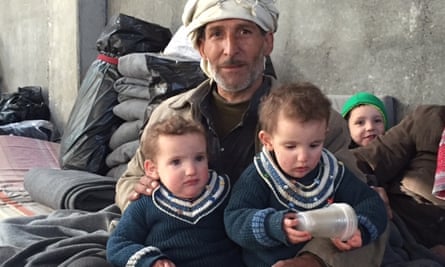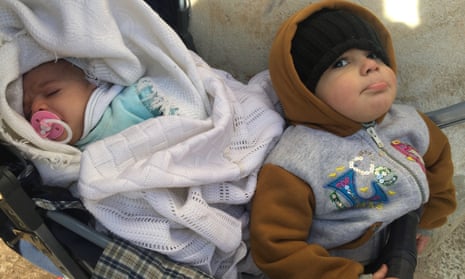Two-year-old Yasser, his woolly hat pulled down to his eyes, stared, silent and unsmiling, in his pram. His 20-day-old sister, Sana, slept beside him, unaware that the entirety of her short life has been spent amid the worst fighting her neighbourhood in east Aleppo has ever seen.
“I see the fear in my children’s eyes,” their mother Suheir laments. Her black abaya and headscarf cover her, except for her eyes. They betray her own fear.
“My husband was killed by a mortar,” she says, without clarifying who killed him. She embarked with her sister and her children on a desperate flight to safety from the rebel-held streets of Saliheen in the midst of violent clashes with the Syrian army and an array of Iranian-backed militias from Iraq, Lebanon, and beyond.
She lifts her cloak slightly to show an injury to her ankle which is now studded with metal pins.
The hardscrabble field around this mother and her pram had been transformed, within hours, into a makeshift way station for the dispossessed in the government-controlled part of Aleppo. Now it’s dotted with hundreds of exhausted families, huddled on hard ground among dust-caked suitcases and plastic bags bulging with all the worldly goods they could carry.
It was unclear whether Suheir was aware of the exact circumstances of her husband’s fate, or didn’t want to say. Or fear may have held back her words.
The agonising stories of tens of thousands of Syrians fleeing for their lives from the frontlines of east Aleppo is now the human face of a destructive war approaching its sixth year.
Almost every year has been a chronicle of profound sacrifice and painful loss mixed with moments of hope on one side or the other of a brutal conflagration that is tearing a nation apart.
But as this year draws to a close, the Syrian army and its powerful Russian and Iranian allies are on the brink of a major victory in Syria’s second city, which would herald their most significant battlefield success of the entire war.

Over the past month, a rapid advance by President Bashar al-Assad’s forces and his loyal friends has pushed rebel fighters into an ever-shrinking enclave. The opposition is also a rough-hewn coalition including groups backed by the west and Arab states, alongside more hardline fighters such as those known as the al-Nusra Front, which is linked to al-Qaida.
Their defences have crumbled faster than expected, even in areas they first seized four years ago in a blaze of firepower and revolutionary fervour.
“A few years ago, they had reduced us to a handful of streets in Aleppo,” said a commander in one of the pro-government militias.
Now about 85% of opposition territory has fallen in their last major urban stronghold. “We had to barter with the rebels to get fuel and food,” he recalls, saying it “looked pretty bad” then. I asked what shifted the dynamic.
“The Russians,” he replies, referring to Moscow’s decision to intervene militarily in September 2015 to support its Syrian ally.
The army takes a small group of journalists to al-Shaar, a district newly back in its hands. Plumes of black smoke and the residue of explosives still envelope the desolate streets, left in utter ruin after what had clearly been heavy fighting. All life and even all the colour has drained from the neighbourhood.
“The army will not stop until all of Aleppo is liberated,” vows General Fawaz Mustafa. “I can’t say how long it will take but I can say it won’t be a long time,” he tells me in the midst of thunderous booms of incessant shelling and gunfire as the fighting goes on.
The army’s advance through the strategic district of al-Shaar opened a route into the winding lanes of the city’s ancient quarter, which also fell within days.

The full story of this decisive battle is still emerging. Over the past 10 days in Aleppo, we’ve heard reports of fighters retreating to the south-east of the city to consolidate their forces. Some accounts speak of local deals in certain districts to allow some fighters to move to other rebel-held areas.
Now the battle for this city, Syria’s former economic heartland, appears to be reaching its final days.
Opposition commanders are vowing to fight to “their last drop of blood”. Behind their defiance, talks are taking place with rebel representatives and Russian officials in Turkey to discuss a pullout from the city.
“What is the sense of continuing this fight in Aleppo when there is almost nothing left to fight for?” asks one aid official in the city who has knowledge of the negotiations.
The opposition faces the same kind of stark choices they were forced to consider on other battlefields: give up their guns and accept a government offer of an amnesty, which could mean being sent to military service; or take their weapons and head to other areas still in rebel hands including Idlib to the south and areas further north, close to the Turkish border.
But while talks go on, so does the bombardment and shelling of areas where thousands of civilians are still believed to be trapped. Rockets and mortars also continue to be fired back into west Aleppo. The fate of Aleppo and its people has focused many minds in world capitals for many months.
On the ground, the mood is now ominous. “I cannot describe what we are living in words. This could be the last Skype interview I do,” says activist and photographer Abdelkader in one of the last rebel-held areas. “What we are living through here in Aleppo no one else has ever endured. Residential complexes could be hit at any second.”
Interviews over the past 10 days with families who have escaped their ordeal reveal terrible stories of daily deprivation and danger.
“We had no rice, no sugar, only very bad bread,” remembers 55-year-old Nahla, who I meet in the derelict Jibreen industrial zone, which was shut down by earlier battles, and is now being used by the government as a processing centre for the displaced.
“If we had stayed any longer, we would have died from hunger,” she says, as the rest of her large extended family listen to their gaunt-faced matriarch, who still manages a warm smile.
Survival is itself a victory for people who have managed to keep going through the past several months. In July, the last road into east Aleppo was cut, creating a punishing siege. Ferocious bombardment by Syrian and Russian warplanes put schools, hospitals and markets in the line of fire.
“This is paradise compared with what we were living,” Nahla exclaims as we stand in a bleak, freezing-cold warehouse without electricity or running water. Thin grey blankets cover a concrete floor crowded with families huddling together for warmth.
The United Nations and local aid agencies are mobilising resources to improve conditions as thousands more arrive each day. Their journey across front lines has been fraught with risk.
“We waited, five families together, until it was dark so that no one would see us and we wouldn’t get shot at,” Nahla tells me. “Then we walked for seven hours straight until we reached a corridor made by the Syrian army.”
Some rebel fighters tried to stop them. “They were firing and shooting at everyone who tried to go,” she says.
Last Friday, a statement from the Geneva Office of the UN High Commissioner for Human Rights confirmed that other accounts like this one were emerging on the ground. And for able young men of fighting age, there are other risks to face if they try to leave. The UN has also expressed concern that large numbers of men were being taken in for questioning by Syrian security forces.
“While it is very difficult to establish the facts in this very fluid and dangerous situation, we have received very worrying allegations that hundreds of men have gone missing after crossing into government-controlled areas,” spokesman Rupert Colville read from a written statement.
But during an informal briefing last week in Aleppo, army spokesman General Samir Suleiman said: “This is a legitimate process. Every country has laws and we need to check who has done their military service.”
Western aid officials working in Syria say a process of checking identities is expected in conflict situations like this. But they add that in Syria, there is, worryingly, a history of thousands of young men going “missing” or being pressed into military service.
Far from the battlefield, there is a constant refrain of urgent calls for orderly evacuations, aid drops, humanitarian pauses, ceasefires, even political talks.
On the ground, thousands continue to just take their chances, fleeing whenever and wherever they can, from what they fear could be the last and worst of all battles for their shattered Aleppo.
Lyse Doucet is the BBC’s chief international correspondent
